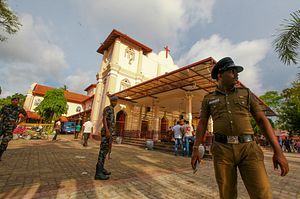Sri Lanka’s government will appoint a parliamentary committee to investigate allegations made in a British television report that officials with the South Asian country’s intelligence were complicit in the 2019 Easter Sunday bombings that killed 269 people, including 42 foreigners from 14 countries.
The attacks, which included simultaneous suicide bombings, targeted three churches – two Catholic and one Protestant – and three tourist hotels during Easter celebrations.
A man interviewed in the Channel 4 videos released Tuesday said he arranged a meeting between a local Islamic State-inspired group, National Thowheed Jamath, and a top state intelligence official to hatch a plot to create insecurity in Sri Lanka and enable Gotabaya Rajapaksa to win the presidential election later that year.
On Wednesday, opposition leader Sajith Premadasa called for an international inquiry into the bombing attack. “A large majority of the people are of the view that a fair local investigation has not been conducted into this attack,” Premadasa said in Parliament.
The lack of a proper local investigation has led to confusion, he added.
Premadasa stressed that justice should be delivered to the victims of the attack and therefore, there is a need for “a transparent international investigation to find out the truth about this attack.”
The man in the Channel 4 program, Azad Maulana, was a spokesperson for a breakaway group of the Tamil Tiger rebels that later became a pro-state militia and helped the Sinhalese-dominated government defeat the rebels and win Sri Lanka’s long civil war in 2009.
Maulana said he arranged a meeting in 2018 between IS-inspired extremists and a top intelligence officer at the behest of his boss at the time, Sivanesathurai Chandrakanthan, the leader of the rebel splinter group-turned-political party.
Rajapaksa was a top defense official during the war, and his older brother, Mahinda Rajapaksa, had been defeated in the 2015 elections after 10 years in power.
A group of Sri Lankans inspired by the Islamic State group carried out the six near-simultaneous suicide bombings in churches and tourist hotels on April 21, 2019. The attacks killed 269 people, including worshippers at Easter Sunday services, locals, and foreign tourists, and revived memories of frequent bombings during the quarter-century war.
Fears over national security enabled Gotabaya Rajapaksa to sweep to power until he was forced to resign in mid-2022 after mass protests over the country’s worst economic crisis. He was replaced as president by Ranil Wickremesinghe, who relied on support from Rajapaksa’s party to win the post in a parliamentary vote. Critics say Wickremesinghe is politically close to the Rajapaksas and has slow-rolled previous corruption investigations targeting the powerful family.
In the Channel 4 report, Maulana said Chandrakanthan had met the brother of the leader of the extremist group, Zainee Hashim, in prison while the politician was detained on allegations of murder and found they could be useful in creating insecurity in the country.
He quoted Chandrakanthan as saying the group seemed “interesting” to him because they were only focused on dying, referring to the belief of some Muslim extremists that acts of perceived martyrdom can grant them paradise in the afterlife.
He said Chandrakanthan agreed to “use them” and that he later utilized his influence as a local politician, arranging for Maulana to help release Hashim by providing him with legal and financial assistance.
Once released, Hashim arranged a meeting between the extremist National Thowheed Jamath and a top intelligence official close to Rajapaksa.
Maulana told Channel 4 that he himself did not participate in the meeting, but that the intelligence officer told him later that creating insecurity was the only way to return the Rajapaksa family to power.
After security camera footage of the bombings was released, Maulana recognized the faces of the attackers carrying bomb-laden backpacks as those whom he had arranged to meet with the intelligence officer, Maulana said in the program.
Channel 4 reported that Maulana had been interviewed by United Nations investigators and European intelligence services over his claims.
Rajapaksa has not commented on the claims. Calls to Chandrakanthan went unanswered Wednesday.
Pro-Rajapaksa lawmaker Mahindananda Aluthgamage rejected the accusations in the documentary. He told Parliament that Rajapaksa had no reason to set off bombs or use suicide bombers to get elected because public support was already on his side as shown by the result of local elections held in 2018.
Labor Minister Manusha Nanayakkara told Parliament on Tuesday that details on the investigation would be announced soon.
Archbishop of Colombo Cardinal Malcolm Ranjith said that authorities had not acted on previous parliamentary and presidential commissions appointed to investigate the attacks.
Officers originally entrusted with investigating the attacks but transferred out by the Gotabaya Rajapaksa government should be brought back to assist, and the current group and those named by Channel 4 should have no role in the probe, Ranjith said.
“We sincerely hope that all those requests will be faithfully carried out by the … president and the government of Sri Lanka. Unless such a transparent and sincere investigation is launched, we do not feel truth and justice will be meted out to the innocent victims of the 2019 Easter attacks,” Ranjith said in a statement.

































